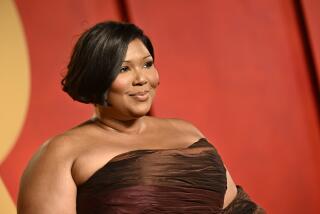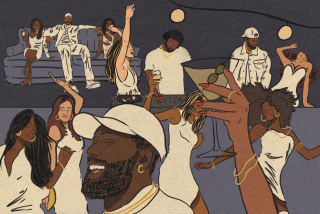R&B singers and reality television are in tune with each other
When K. Michelle released “Rebellious Soul” last year, it was the highest charting debut for a female R&B singer since 2011. Largely unknown, she didn’t even have a song in the Top 40.
But the Memphis native (born Kimberly Michelle Pate) had a powerful promotion tool on her side: reality television.
While unscripted TV has long made stars out of oddball personalities, it’s also helped reinvigorate the careers of fallen stars — see Flavor Flav, Ray J and Kim Kardashian. Now, a slew of shows anchored by rising and veteran singers such as “Love & Hip Hop” and “R&B Divas” has become the genre’s new normal.
“I really didn’t have anything to lose,” said the 30-year-old K. Michelle, who is part of the cast of VH1’s “Love & Hip Hop.” “I had just gotten out of a record deal ... and it made me think, ‘Wow, I don’t have a brand.’ I wanted people to hear my music, but I wanted to tell my story.”
Since Michelle’s role in the “Love & Hip Hop” franchise began, she has headlined a sold-out tour, won new artist honors at the Soul Train Awards and NAACP Image Awards and scored a spinoff series that will air in the fall.
“I took it very seriously. I went in it saying this is not going to overshadow everything about my music,” said Michelle. “A lot of negotiating went into my story line. [I told producers] I’m not doing this scene unless you give me this scene with my music.”
A protege of Missy Elliott in the late ‘90s, Cynthia “Lil Mo” Loving bluntly explains the ongoing marriage between R&B singers and reality TV: “There are other ways to break yourself, but it takes too long.”
Loving is featured on TV One’s hit “R&B Divas: Los Angeles.” The show premiered last year and is a spinoff of the Atlanta-based original. Last month, the premiere of its second season outperformed the 2014 ESPY Awards in the ratings.
“I’ve written a book, I’ve recorded an album, I’ve done a movie, I have a detox program, I have a hair line,” Loving continued. “For everything that the music industry didn’t afford you, being on TV is a whole different opportunity and platform.”
Since 2011, Toni Braxton and her sisters (Tamar, Traci, Towanda and Trina) have anchored WE tv’s “Braxton Family Values.” The show not only has become a flagship for the network but also has yielded significant rewards for her family.
Toni Braxton’s first album in four years, “Love, Marriage & Divorce,” debuted at No. 1 on Billboard’s R&B/Hip-Hop Albums chart when it was released in February. Tamar Braxton, the youngest of the sisters, revived a stalled solo career after she broke out on the series as a quotable scene stealer. Thirteen years after her debut flopped, her comeback album, “Love and War,” debuted at No. 2 on the Billboard 200 and earned three Grammy nods.
The success of “Braxton Family Values” helped establish WE tv as a network with an eye toward R&B fans. The same audience that watched the Braxtons tuned into “Mary Mary,” a series featuring the gospel sister act of the same name that is now in its third season. And when ‘90s girl group SWV launched another comeback, they did so on the network with “SWV Reunited.”
“The natural inclination when people see success in TV on one network, they tend to try to replicate it,” said Marc Juris, WE tv president and general manager. “I can’t speak for other networks, but we are getting pitched lots and lots of shows like this. Our first priority is always a great show. The music, for us, is second to this television story and how well they connect with the camera, how honest they will be and how compelling the story will be.”
TV One has found similar success with its “R&B Divas” franchise. Launched in 2012, the original Atlanta-based series followed Faith Evans, who co-produced the series with Nicci Gilbert. Its debut was the most-watched premiere in the history of the network, and Evans’ subsequent album (also titled “R&B Divas”) nabbed a Grammy nomination.
Despite exiting the series, Evans still believes there is a benefit. “It helps to be in people’s living rooms every week for two months,” she said. “Whatever you choose to do with it is on you.”
But promotion can’t be the sole motivation, said WE tv President and General Manager Marc Juris. “If you’re setting out to do a show for a business purpose and not to tell a story, chances are it’s not going to work,” he said.
“I think it’s a great runway for a project, but it does not discount the fact that you have to have a great song; otherwise, you’re going to be a novelty,” Juris added.
But SWV’s Leanne “Lelee” Lyons wonders how her group’s 2012 comeback effort, “I Missed Us,” would have fared if it had been timed to their series. Released 15 years after their split, the album was coolly received, selling 14,000 copies its first week.
“We had been gone for so long. We were fortunate to have our loyal fans, but if they would have seen us go through that process of recording the last album, it would have made a huge difference,” she said during a break from filming Season 2.
D’Angela Proctor, senior vice president of programming and production for TV One, said these shows are “a defibrillation process” that ultimately puts talent “back in the conversation.”
“It’s like they are still alive, but they are hanging on. At least that’s the case for a lot of artists on our show,” said Proctor. “When they first came into the industry, it was about music, but now they are having to reinvent themselves.”
Michelle’s reality show will launch in the fall on VH1, and the network will also debut “Love & Hip Hop: Hollywood” in September. A third entry in the “R&B Divas” franchise is being evaluated, and Keyshia Cole is timing her coming album with her third reality series (her first, “The Way It Is,” was once the most-watched program in BET’s history after its 2006 debut).
“I feel sorry for my peers on labels that are new without reality shows,” Michelle said. “Nowadays, these kids don’t care that you can sing. They want to see that personality. I definitely used that to my advantage, and it worked.”
More to Read
The biggest entertainment stories
Get our big stories about Hollywood, film, television, music, arts, culture and more right in your inbox as soon as they publish.
You may occasionally receive promotional content from the Los Angeles Times.







